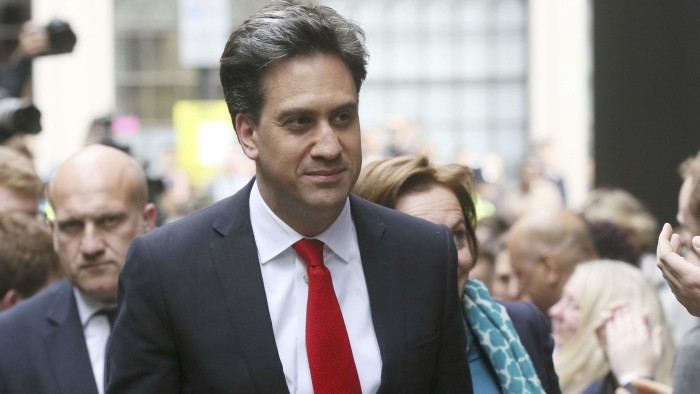Prepare for the revenge of the Blairites


Roula Khalaf, Editor of the FT, selects her favourite stories in this weekly newsletter.
Stand by for the revenge of the Blairites. For nearly five years, those who believed in New Labour have been predicting this moment and even relishing the prospect of the greatest “I told you so” moment in recent politics.
From the moment Ed Miliband defeated their champion and his brother, David, they warned this would happen. Over the next five years, as poll after poll showed the Tories languishing and David Cameron stumbling, they steadfastly predicted a Tory majority. Ed was too leftwing; he had vacated the centre ground.
Until now, most kept their remarks off the record, although Mr Blair himself summed up the view succinctly last Christmas when he observed that the election risked becoming one in which “a traditional leftwing party competes with a traditional rightwing party, with the traditional result”.
Mr Miliband’s friends will blame a campaign of vilification in the Tory media. They have a point. Mr Miliband faced a hostility even greater than that experienced by Neil Kinnock — an ire fuelled by his position on press regulation. He endured years of the most cruel and personal abuse as well as relentless political sniping. There is also no doubt that Mr Miliband was judged on absurd superficial shortcomings — how he looked, how he stood and so on.
But however much Labour supporters will want to claim that the media created that public perception, the hard reality is that it is more likely that it simply crystallised what voters already sensed. Mr Miliband did not lose because of his inability to consume a bacon sandwich gracefully. He lost because in their quiet moments of reflection, voters did not believe he spoke to their aspirations and did not trust him on the economy.
Mr Miliband won the Labour leadership by defining himself against Tony Blair, the prime minister whose grasp of political realities delivered three consecutive victories. Shortly after Mr Miliband’s victory, former Labour leader Neil Kinnock observed that “we’ve got our party back”. He was right: they had got his party back. This view prevailed throughout Mr Miliband’s leadership. One cheerleader, Neal Lawson, even observed of the Blair era: “In hindsight the wrong people were voting Labour”. For Mr Lawson, Mr Blair’s very success showed “the limited nature of his ambitions”.
Well, Mr Miliband has tested that theory to destruction. He abandoned the big tent for a smaller, comfortable core vote strategy which did not confront his party with a need for uncomfortable compromises. Like his mentor, Gordon Brown, he drew dividing lines between left and right rather than seeking to pull voters over to his side. He refused to recognise the central significance of stewardship of the economy and the need to persuade voters that he could be trusted with it. He instinctively veered towards statist solutions and deployed the language of the academic left when talking about business and markets. He was instinctively uncomfortable even with Labour’s education reforms and appeared to take his line from the teaching unions.
In depth

David Cameron is back in Downing Street for a second term after a dramatic victory that defied predictions to trounce Labour and win an outright majority in parliament
Further reading
So many tenets of new Labour were rejected. These were not only philosophical but also tactical. By refusing to own up to economic failures — even a week ago, Mr Miliband was refusing to say the last Labour government overspent — he ignored a basic political principle of Mr Blair’s pollster, Philip Gould, that defeated parties must “concede and move on”. The rules of engagement are very clear: the voters are always right. Mr Miliband spent five years trying to persuade them they were wrong.
The anti-Blairite stance was not enough to save him in Scotland and the march from the centre-ground cost him in England.
Now those Blairites who were scorned and blamed for Labour’s woes are ready to fight again for the soul of their party. This does not mean they will win. They must first find a champion of sufficient charisma to carry the day and face down a union vote that does not want to return to the centre.
But a taste of what is to come was offered on Friday by Jonathan Powell, Mr Blair’s former chief of staff: “You cannot win from the left; you can win from the centre-left, but you cannot win from the left. When we learn that again, we will win again.”
Comments